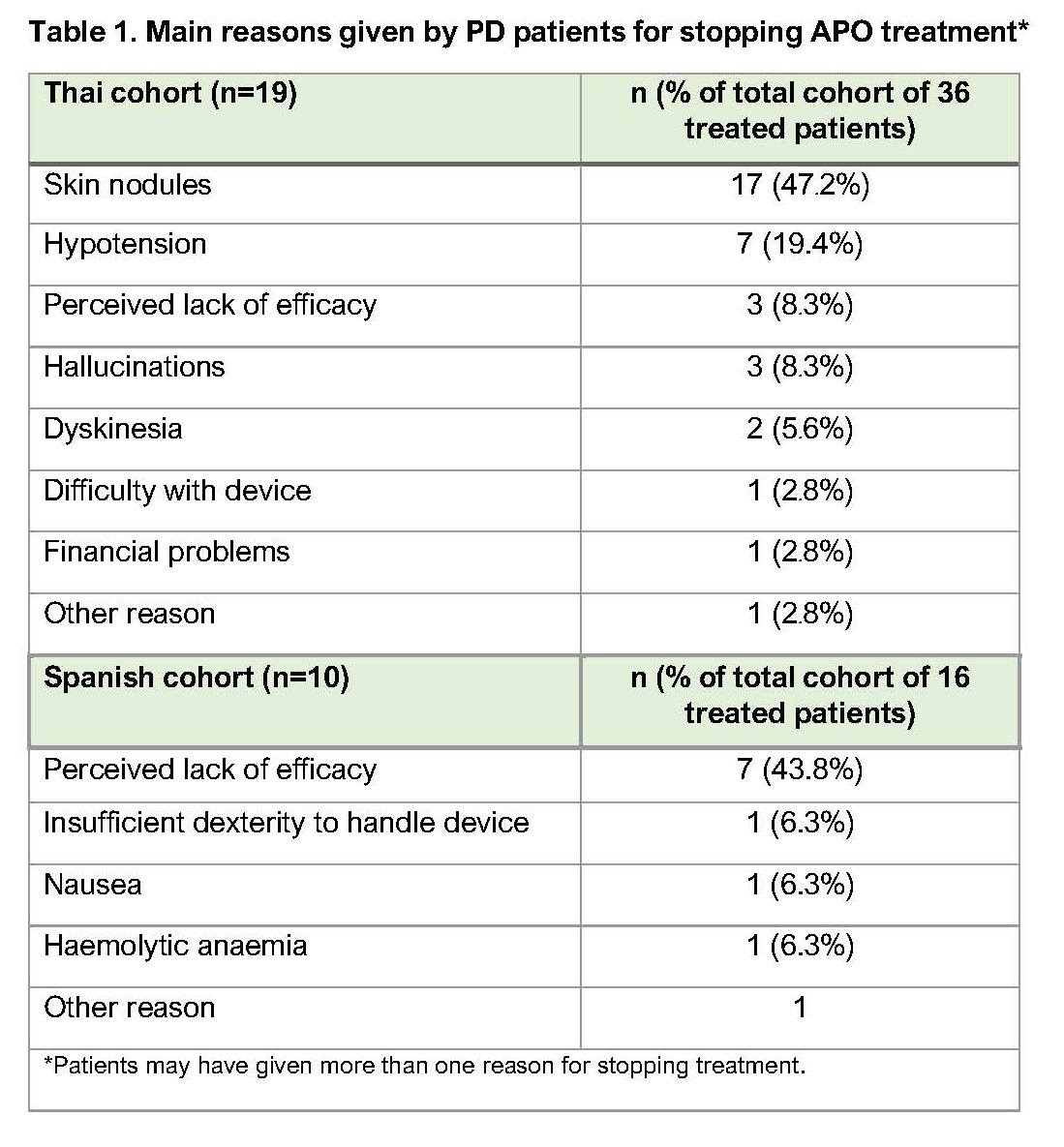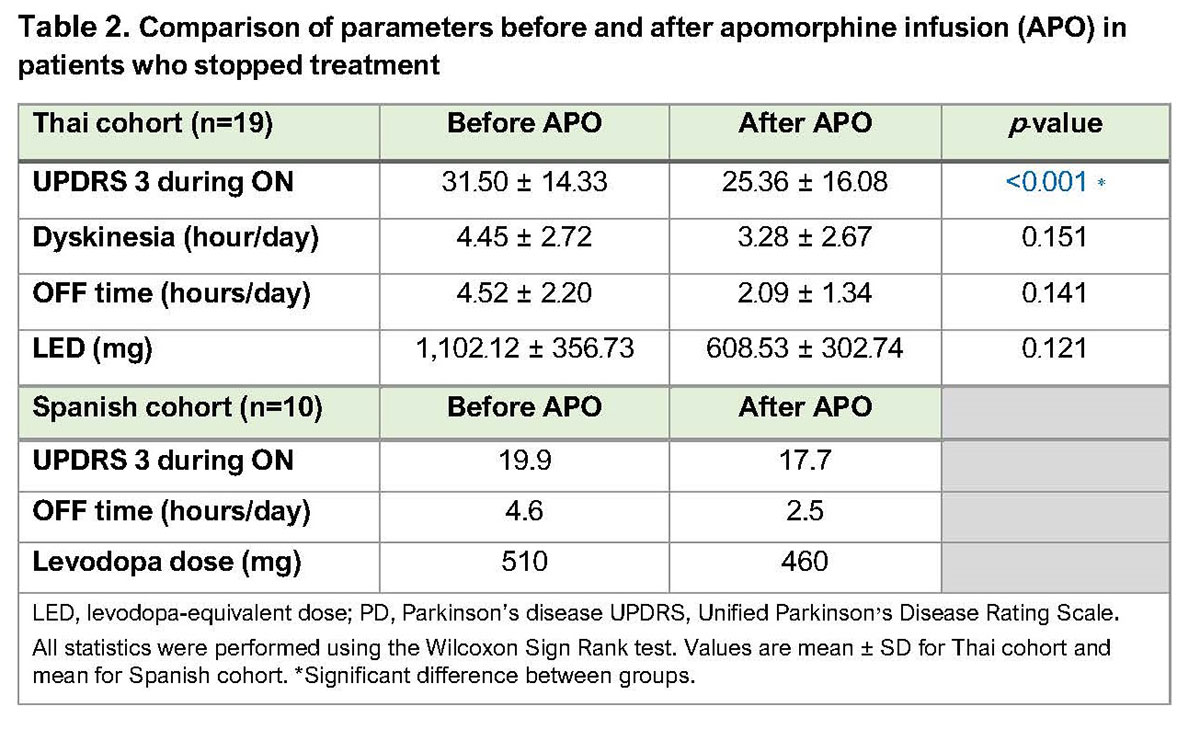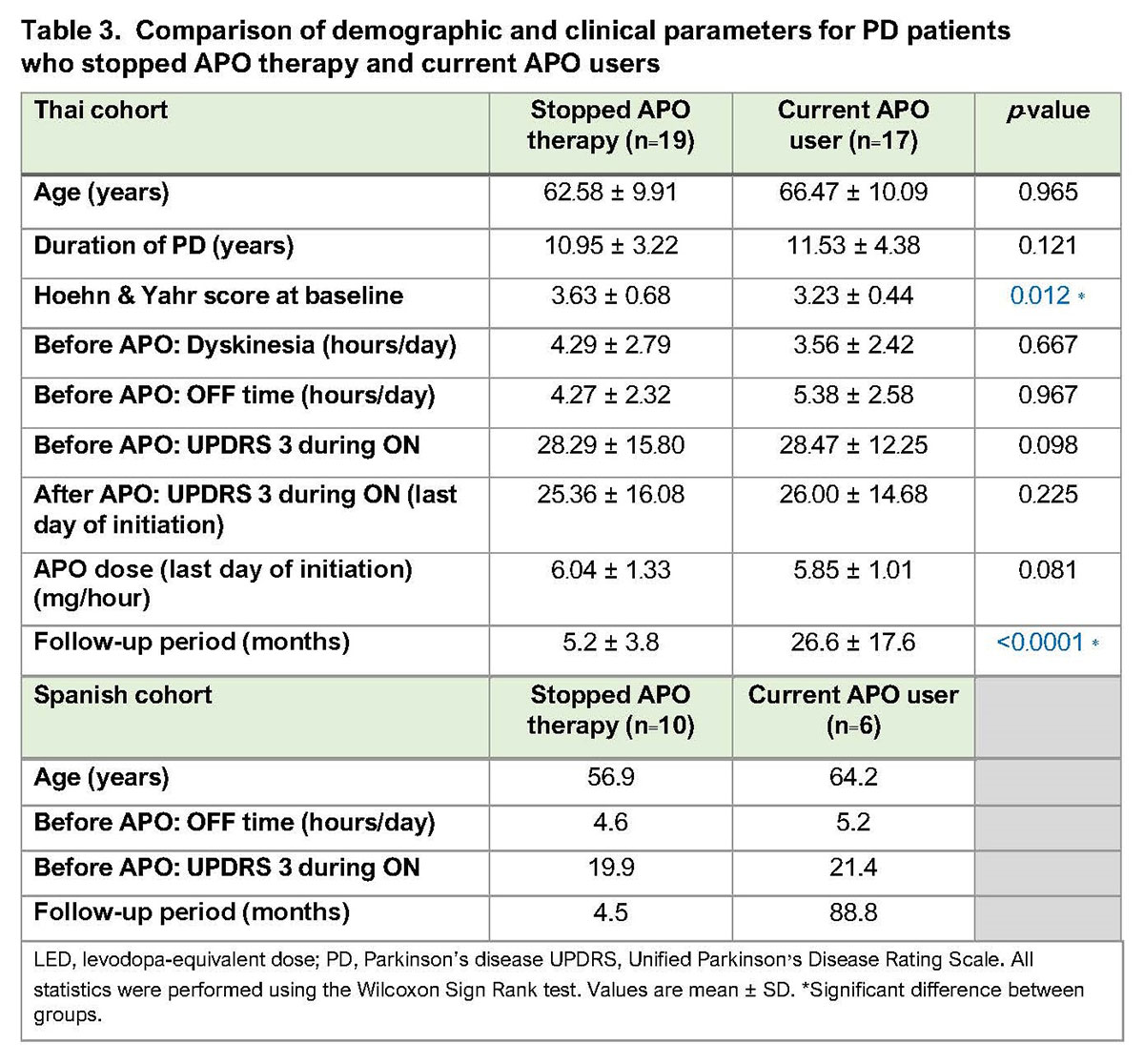Session Information
Date: Monday, September 23, 2019
Session Title: Clinical Trials, Pharmacology and Treatment
Session Time: 1:45pm-3:15pm
Location: Agora 3 West, Level 3
Objective: To evaluate the long-term efficacy of APO in PD patients treated at two specialist centres in Spain and Thailand, and to determine the reasons for stopping therapy.
Background: Subcutaneous APO, administered using a removable mini-pump, is an effective a non-surgical option for continuous dopaminergic drug delivery in PD patients.1,2 The clinical benefits of APO are sustained with long-term use.3-6 In clinical practice a substantial proportion of patients discontinue treatment prematurely.
Method: Demographic and clinical outcomes data were collected for PD patients treated with APO at Universidad Autonoma de Madrid, Spain (n=16) and Chulalongkorn Centre of Excellence for PD & Related Disorders, Bangkok, Thailand (n=36), along with reasons for discontinuing treatment.
Results: 19 patients (52.7%) in the Thai cohort (TC) and 10 patients (62.5%) in the Spanish cohort (SC) discontinued treatment within around 6 months of initiation, most commonly due to skin nodules (TC) and perceived lack of efficacy (SC) (Table 1). Those who continued APO tended to stay on treatment. In both cohorts APO resulted in a reduction in UPDRS 3 motor scores in patients who chose to stop therapy (Table 2). In the TC 17 patients have continued APO (mean follow-up 26.6 months); in the SC 6 have continued (mean follow-up 88.8 months). In the TC, there were no significant differences in any parameters between current users and patients who stopped APO, other than Hoehn & Yahr score at baseline which was significantly higher in patients who discontinued (Table 3).
Conclusion: Data from our two centres show that the majority of patients discontinued APO within the first 6 months, warranting further investigation. UPDRS 3 scores of patients who discontinue treatment suggest APO is still effective for managing motor symptoms, even when ‘perceived lack of efficacy’ is given as a reason for stopping. A contributing factor may be that APO is a minimally-invasive therapy and therefore relatively easy to discontinue if difficulties arise. Any manageable issues should be discussed and resolved where possible so that patients can continue treatment and receive optimum clinical benefits. Prospective data collection in a registry may give further insights into these issues.
References: 1. Trenkwalder, C., et al., Expert Consensus Group report on the use of apomorphine in the treatment of Parkinson’s disease – Clinical practice recommendations. Parkinsonism Relat Disord, 2015. 21(9): p. 1023-30. 2. Katzenschlager, R., et al., Apomorphine subcutaneous infusion in patients with Parkinson’s disease with persistent motor fluctuations (TOLEDO): a multicentre, double-blind, randomised, placebo-controlled trial. Lancet Neurology, 2018. 3. Borgemeester, R.W., M. Drent, and T. van Laar, Motor and non-motor outcomes of continuous apomorphine infusion in 125 Parkinson’s disease patients. Parkinsonism Relat Disord, 2016. 23: p. 17-22. 4. Garcia Ruiz, P.J., et al., Efficacy of long-term continuous subcutaneous apomorphine infusion in advanced Parkinson’s disease with motor fluctuations: a multicenter study. Mov Disord, 2008. 23(8): p. 1130-6. 5. Sesar, A., et al., Continuous subcutaneous apomorphine infusion in advanced Parkinson’s disease: 10-year experience with 230 patients. J Neurol, 2017. 264(5): p. 946-954. 6. Tyne, H.L., et al., A 10 year retrospective audit of long-term apomorphine use in Parkinson’s disease. J Neurol, 2004. 251(11): p. 1370-4.
To cite this abstract in AMA style:
R. Bhidayasiri, O. Phokaewvarangkul, K. Boonpang, Y. Thongchuam, T. Boonmongkol, P. Garcia Ruiz. Long-term apomorphine infusion (APO) users versus short-term APO users: What is the reason to discontinue therapy? A multi-centre study [abstract]. Mov Disord. 2019; 34 (suppl 2). https://www.mdsabstracts.org/abstract/long-term-apomorphine-infusion-apo-users-versus-short-term-apo-users-what-is-the-reason-to-discontinue-therapy-a-multi-centre-study/. Accessed December 15, 2025.« Back to 2019 International Congress
MDS Abstracts - https://www.mdsabstracts.org/abstract/long-term-apomorphine-infusion-apo-users-versus-short-term-apo-users-what-is-the-reason-to-discontinue-therapy-a-multi-centre-study/



